11 Signs Ozempic Is Not for You

Type 2 diabetes drug Ozempic is clearly very effective as a weight-loss tool—but it may not work for everyone. As people respond differently to different drugs, side effects that barely register for one person may seem debilitating for another. Is it worth it? Some experts say the weight loss results are beneficial far beyond mere superficial reasons. "By treating obesity, you're effectively potentially treating over 200 other obesity-related or weight-related diseases," Dr. Ania Jastreboff, an associate professor of medicine at the Yale School of Medicine who serves on the scientific advisory board of Novo Nordisk, tells NBC News.
"Given the wide use of these drugs, these adverse events, although rare, must be considered by patients who are contemplating using the drugs for weight loss because the risk-benefit calculus for this group might differ from that of those who use them for diabetes," researcher Mohit Sodhi tells NBC News. If the negative side effects outweigh the efficacy of the medication, it might not seem worth it. Here are 11 signs Ozempic may not be for you.
Vision Problems
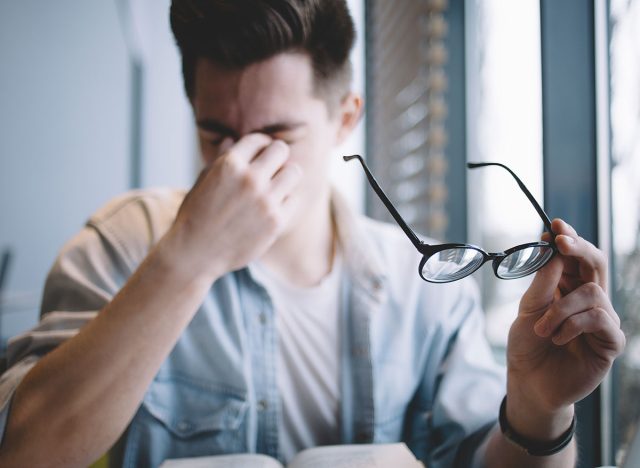
Ozempic may negatively impact your eyesight. "It may seem strange that a drug made to help control diabetes could make your eyesight worse, but it's something we've known about for a while," says Raj K Maturi, MD. "A large clinical study suggested that there is an association between blood sugar control and worsening of diabetic retinopathy."
Ozempic Face
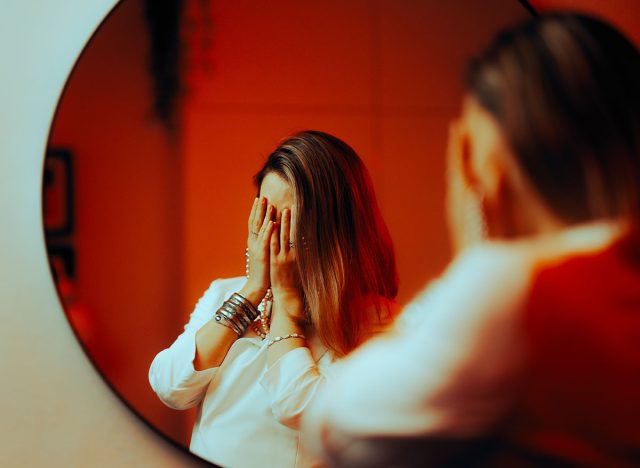
"Ozempic face" is the term used to describe the effect of quick fat loss on facial appearance. "You may have heard about "Ozempic face" as a side effect of GLP-1 drugs, though the term is misleading because this can be a side effect of any GLP-1 drug or any other cause of rapid weight loss," says Harvard Health. "If weight is lost in a more gradual way, these changes may not be as noticeable. It's the faster pace of weight loss that occurs with GLP-1 drugs that can make facial changes more obvious."
Vomiting and Nausea

Nausea and vomiting are among the more debilitating side effects of taking Ozempic. "Nausea can be managed by avoiding strong smells and eating crackers, mint, or ginger-based food or drinks about a half hour after taking a GLP-1 drug," says Harvard Health. "Vomiting can be managed by staying well hydrated and having more frequent meals in smaller amounts."
Gallbladder Warning

In some rare cases, taking drugs such as Ozempic may cause gallbladder issues. "Given the wide use of these drugs, these adverse events, although rare, must be considered by patients who are contemplating using the drugs for weight loss because the risk-benefit calculus for this group might differ from that of those who use them for diabetes," according to research published in the Journal of the American Medical Association.
Low Blood Sugar
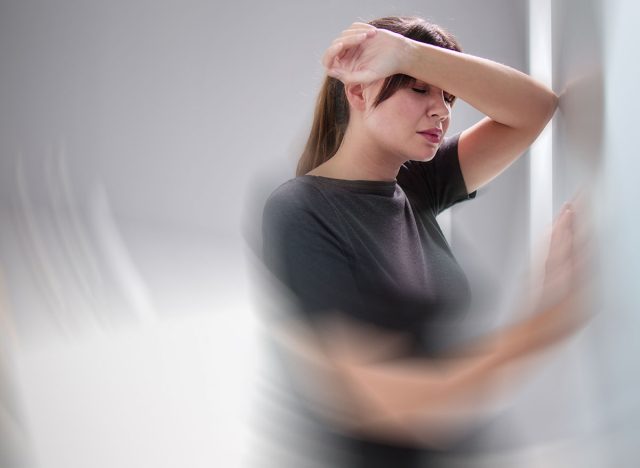
Taking Ozempic may cause hypoglycemia, which comes with its side effects. "Signs and symptoms of low blood sugar may include dizziness or lightheadedness, blurred vision, anxiety, irritability or mood changes, sweating, slurred speech, hunger, confusion or drowsiness, shakiness, weakness, headache, fast heartbeat, and feeling jittery" Ozempic makers warn.
GI Issues
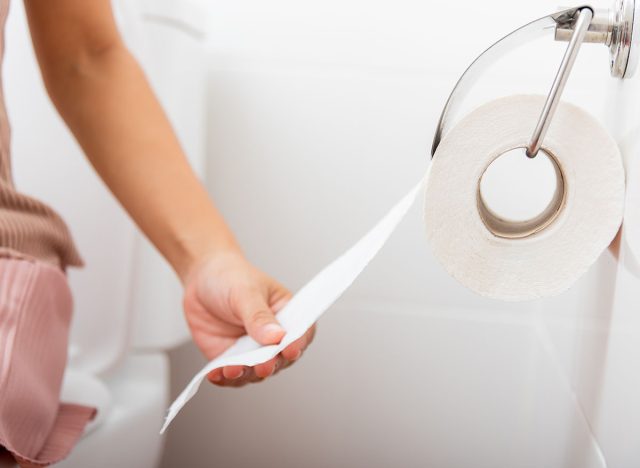
Some people experience unpleasant GI issues such as diarrhea and constipation. "Diarrhea can be managed by drinking plenty of water and avoiding dairy products and high-fiber foods until symptoms go away," says Harvard Health. "Constipation can be managed by getting enough fiber in your diet and drinking plenty of water."
RELATED: The Healthiest and Unhealthiest Ways to Cook Your Eggs
Pancreatitis

Ozempic is linked to pancreatitis, so people at risk of the condition should be wary. "We generally do not use this class of medicines if someone has a history of pancreatitis," Dr. Cecilia Low Wang tells UCHealth.
Kidney Issues

"In people who have kidney problems, diarrhea, nausea, and vomiting may cause a loss of fluids (dehydration), which may cause kidney problems to get worse," Ozempic makers warn. "It is important for you to drink fluids to help reduce your chance of dehydration."
Adjust Your Dose
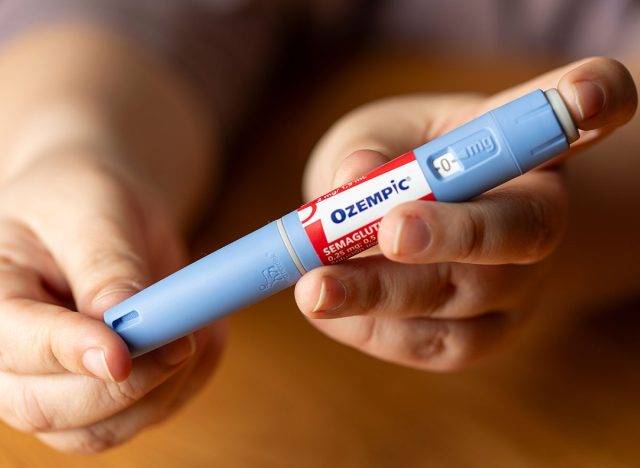
Sometimes, the dose itself might be the problem. "About one in five people might stop because they are experiencing bad side effects," Dr. Low Wang says. "I encourage some patients to stay at the lower dose level for a longer period of time to see if they can tolerate it better and still get some benefit from the medication. Or if they don't tolerate this medication, we might try a different one."
Address the Issue
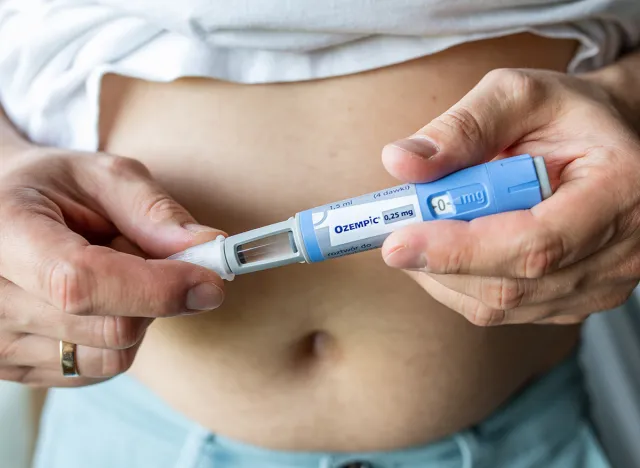
Taking Ozempic without addressing the cause of weight gain may undermine long-term weight loss. "There are lots of emotional and behavioral factors that contribute to health and eating patterns. Suppose you're not addressing those issues while taking a medication that's designed to help weight loss. In that case, you're really going to compromise the overall effectiveness of the medicine," says Joseph Trunzo, PhD, Psychology professor and associate director of Bryant's School of Health and Behavioral Sciences.
RELATED: 7 Things to Do When You Wake Up to Melt Fat
Weight Loss Plateau
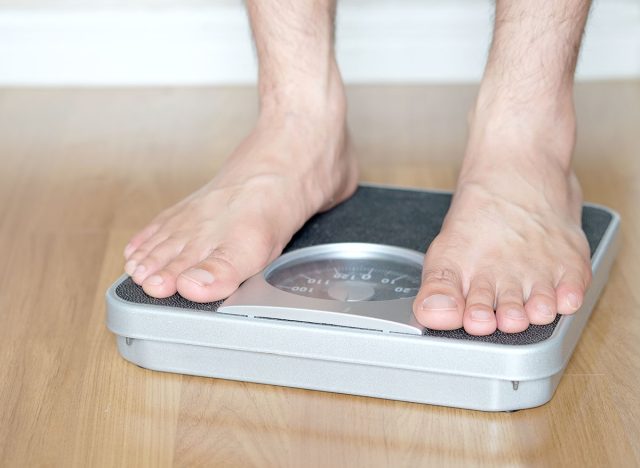
If you stop taking Ozempic, your weight may pile back on. "It's important to note that if you start taking either of these drugs for weight loss, your body may get used to it, establishing a new normal," says UC Davis Health. "This can cause your weight to plateau. Research has shown that if you stop taking Ozempic (or Wegovy), it's likely that you will gain back the weight you lost." And if you enjoyed this article, don't miss 20 Incredible Ozempic Success Stories of All Time.




